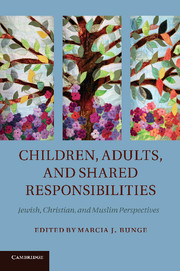Book contents
- Frontmatter
- Contents
- List of Contributors
- Acknowledgments
- Introduction
- PART I RELIGIOUS UNDERSTANDINGS OF CHILDREN
- Chapter 1 The concept of the child embedded in Jewish law
- Chapter 2 Children's spirituality in the Jewish narrative tradition
- Chapter 3 Christian understandings of children
- Chapter 4 Human dignity and social responsibility
- Chapter 5 Islam, children, and modernity
- Chapter 6 Muslim youth and religious identity
- Chapter 7 Imagining childism
- Chapter 8 Talking about childhood and engaging with children
- PART II RESPONSIBILITIES OF CHILDREN AND ADULTS
- Select bibliography
- Index of names
- Index of subjects
- References
Chapter 3 - Christian understandings of children
Central biblical themes and resources
from PART I - RELIGIOUS UNDERSTANDINGS OF CHILDREN
Published online by Cambridge University Press: 05 October 2012
- Frontmatter
- Contents
- List of Contributors
- Acknowledgments
- Introduction
- PART I RELIGIOUS UNDERSTANDINGS OF CHILDREN
- Chapter 1 The concept of the child embedded in Jewish law
- Chapter 2 Children's spirituality in the Jewish narrative tradition
- Chapter 3 Christian understandings of children
- Chapter 4 Human dignity and social responsibility
- Chapter 5 Islam, children, and modernity
- Chapter 6 Muslim youth and religious identity
- Chapter 7 Imagining childism
- Chapter 8 Talking about childhood and engaging with children
- PART II RESPONSIBILITIES OF CHILDREN AND ADULTS
- Select bibliography
- Index of names
- Index of subjects
- References
Summary
Although Christians today and in the past are highly diverse, they share a long history of concern for and attention to children. They have prayed, studied, and worshipped with children in their homes and congregations. They have established many institutions to serve children, such as orphanages, schools, and pediatric hospitals. They have educated children and founded schools, colleges, and universities around the world. They have written religious education materials for use in the home, in congregations, and on the streets. They have composed songs and hymns and published sermons, stories, prayers, liturgies, and Bibles explicitly for children.
Christians have built many of their beliefs and practices regarding children on their understandings of the Bible. Although there are slight variations among major branches of Christianity regarding the biblical canon, the Bible for Christians generally includes the twenty-seven books of the New Testament and the same material found in the Jewish Tanakh, although Christians divide and re-arrange this material differently and call it the Old Testament. The books of the Bible are teeming with direct and indirect references to children and adult--child relationships. Biblical passages refer to the conception, birth, and lives of named and unnamed children. The Bible also portrays complex and diverse examples of adult--child relationships and responsibilities. Adults are commanded to teach, instruct, and train children “in the way” they should go (Proverbs 22:6) and bring them up “in the discipline and instruction of the Lord” (Ephesians 6:4). Children are commanded to “honor” and “obey” their parents (Ephesians 6:1–3). The New Testament gospels also include passages about Jesus’ own birth and childhood and many stories about Jesus healing, welcoming, and blessing children. Jesus also refers to adults as “children of God” and claims that “unless you change and become like children, you will never enter the kingdom of heaven” (Matthew 18:3; cf. Luke 18:17; Mark 10:15). Even biblical visions of hope and restoration are often described with the help of images of children. “The wolf shall live with the lamb,” and “a little child shall lead them” (Isaiah 11:6); and “the streets of the city shall be full of boys and girls playing in its streets” (Zechariah 8:5).
- Type
- Chapter
- Information
- Children, Adults, and Shared ResponsibilitiesJewish, Christian and Muslim Perspectives, pp. 59 - 78Publisher: Cambridge University PressPrint publication year: 2012
References
- 2
- Cited by



